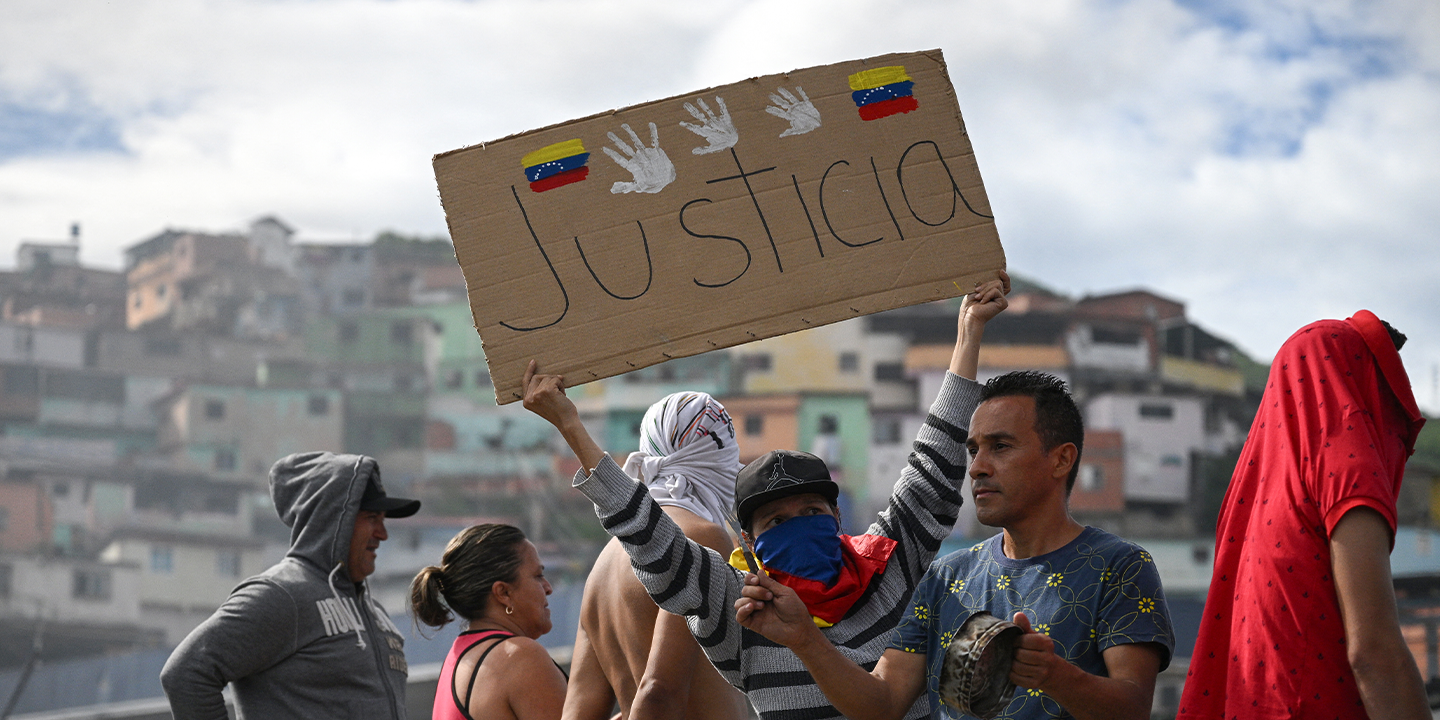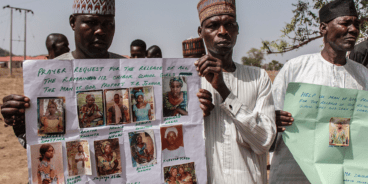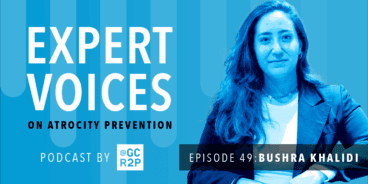

Atrocity Alert No. 447: UN Human Rights Council, Democratic Republic of the Congo and Afghanistan
Atrocity Alert is a weekly publication by the Global Centre for the Responsibility to Protect highlighting situations where populations are at risk of, or are enduring, mass atrocity crimes.
OUTCOMES OF THE 59TH SESSION OF THE UN HUMAN RIGHTS COUNCIL
Today, 9 July, the UN Human Rights Council (HRC) concluded its 59th session. Over nearly four weeks, UN member states received updates from independent experts and engaged in discussions on how to address ongoing atrocity crises. The HRC held Interactive Dialogues on numerous country situations, including Afghanistan, Central African Republic, Myanmar (Burma), Nicaragua, Sudan, Syria and Ukraine.
The HRC received grim updates on the Occupied Palestinian Territory. In its latest report, the Commission of Inquiry (CoI) warned that “20 months into the most ruthless, prolonged and widespread attack against the Palestinian people since 1948, the goal of the Israeli government is abundantly clear: the destruction of life in Gaza.” The day prior, on 16 June, UN Special Rapporteur Francesca Albanese published a report documenting how corporate and private sector actors have profited from Israel’s occupation of Gaza and the West Bank, alongside apartheid policies and the commission of war crimes, crimes against humanity and genocide.
On 26 June the Office of the UN High Commissioner for Human Rights (OHCHR) published its latest report on Venezuela, expressing regret over the continued inability to fully re-establish in-country presence. Days later, on 1 July, Venezuela’s National Assembly declared UN High Commissioner for Human Rights Volker Türk persona non grata, raising concerns about OHCHR’s future role in the country.
The HRC also held an Enhanced Interactive Dialogue on the first oral update from the newly established Fact-Finding Mission (FFM) on the Democratic Republic of the Congo. During the session, High Commissioner Türk stated, “The scale and range of violations and abuses the Fact-Finding mission is documenting are horrendous,” such the “horrific use” of sexual violence, including as a means of reprisal against communities and specific ethnic groups, summary and extrajudicial executions, enforced disappearances and torture, among other likely war crimes. While the resolution establishing the FFM also envisioned the creation of a CoI, OHCHR warned that the CoI cannot be operationalized until at least 2026 due to the UN’s worsening political and liquidity crisis – highlighting the serious implications for the UN human rights system’s capacity to fulfill its mandates.
The impact of the UN’s financial crisis surfaced in a variety of ways. Eritrea introduced a resolution to block the renewal of the UN Special Rapporteur on Eritrea’s mandate. Although the resolution failed, the effort reflects a troubling trend: states using the financial crisis as an excuse to weaken oversight mechanisms. As Savita Pawnday, Executive Director of the Global Centre for the Responsibility to Protect, warned, “This underscores the urgent need for member states to go beyond rhetorical support and take concrete action to defend and strengthen the UN human rights system at a moment of profound institutional vulnerability.”
The session also brought attention to broader reform efforts. On 23 June, during the Interactive Dialogue with the acting UN Special Adviser on the Prevention of Genocide, Sierra Leone delivered a statement on behalf of the Group of Friends of R2P. The statement emphasized the centrality of R2P in the ongoing UN80 reform process, and called for stronger early warning, risk analysis and preventive action across the UN system to prevent atrocities at every stage of conflict.
Upholding the Responsibility to Protect requires not only political will but also sustained support for the mandates and mechanisms that give the UN system its ability to act credibly and effectively. The HRC has both a responsibility and an opportunity to act on the recommendations of the UN human rights system, ensuring accountability for victims and survivors and helping to prevent future atrocities.
ACCOUNTABILITY CRUCIAL AS DRC AND RWANDA SIGN FRAGILE PEACE AGREEMENT
On 27 June the Democratic Republic of the Congo (DRC) and Rwanda signed a United States (US)-brokered peace agreement, committing to cease hostilities, respect territorial integrity and end support for non-state armed groups. While the deal offers a rare diplomatic opening in a region scarred by decades of armed conflict and mass atrocities, it lacks key commitments to justice, accountability and redress – elements essential to breaking the entrenched cycle of violence and impunity. Notably, the Rwandan-backed March 23 Movement (M23) armed group, which has led widespread abuses in the context of the tensions between DRC and Rwanda, is not party to the agreement. Separate negotiations mediated by Qatar between the M23 and DRC are expected, but the M23’s exclusion from the US-brokered agreement casts serious doubt on the prospects for comprehensive implementation or meaningful de-escalation.
Since early 2025 eastern DRC has witnessed a sharp escalation in conflict as M23 – supported by the Rwanda Defence Force – intensified its offensive in North and South Kivu provinces. The offensive has been marked by widespread human rights violations and likely war crimes. Congolese army-backed Wazalendo militias have also perpetrated grave abuses that may amount to war crimes. According to UN High Commissioner for Human Rights Volker Türk, preliminary findings by the UN Fact-Finding Mission (FFM) on the situation in the South and North Kivu provinces reveal “an apparent total disregard for the protection of civilians” during and after operations.
At the root of the ongoing crisis lies a thriving conflict-economy. The illicit extraction and competition for control over lucrative mineral resources continues to fuel violence and abuses against civilians in the region. In parallel with the ceasefire agreement, a proposed US-brokered critical minerals deal involving Rwanda and the DRC has raised serious concerns. This separate agreement would grant Western companies access to the region’s vast deposits of tantalum, gold, lithium and cobalt – vital for electric vehicles and advanced technologies. However, the deal risks replicating extractive dynamics that have historically fueled conflict in eastern DRC, while disproportionately benefiting Rwandan and US interests. Nobel Laureate Denis Mukwege warned the deal “would amount to granting a reward for aggression” while legitimizing the “plundering of Congolese natural resources.”
While hailed as a diplomatic success, the peace agreement’s exclusion of M23 and failure to address root causes – including impunity for past abuses, longstanding ethnic grievances and illicit resource exploitation – risk rendering it ineffective. The international community must ensure that peace efforts extend beyond military and economic interests and support existing mechanisms like the FFM, alongside other accountability initiatives. Any minerals deal must include binding due diligence mechanisms, human rights protections and equitable benefit-sharing. Durable peace will only be possible by centering the rights and needs of victims and affected communities – otherwise, it will remain out of reach for millions.
MASS FORCED RETURNS WORSEN AFGHANISTAN’S CRISIS AMID TALIBAN REPRESSION
Populations from Afghanistan are facing an alarming surge in forced returns from neighboring countries, exacerbating an already dire humanitarian and human rights crisis under Taliban rule. Since January the International Organization for Migration (IOM) has recorded over 714,000 Afghan returnees from Iran, with more than 250,000 returning in June ahead of a government deadline requiring Afghans to leave or face deportation. Meanwhile, Pakistan has entered the second phase of its Illegal Foreigners’ Repatriation Plan, continuing mass expulsions amid rising anti-Afghan sentiment. The growing number of returns is overwhelming local infrastructure and compounding protection risks for returnees. IOM Director General Amy Pope said, “The scale of returns is deeply alarming and demands a stronger and more immediate international response. Afghanistan cannot manage this alone.”
Women and girls returning to Afghanistan face grave risks under the Taliban’s systematic and institutionalized regime of gender-based discrimination. On 8 July the International Criminal Court (ICC) issued arrest warrants against Taliban Supreme Leader Haibatullah Akhundzada and Chief Justice Abdul Hakim Haqqani for the crime against humanity of gender persecution. Since seizing power in 2021 the Taliban have issued more than 100 decrees and regulations targeting women and girls, in violation of Afghanistan’s international obligations under the Convention on the Elimination of All Forms of Discrimination Against Women. Women and girls are banned from education, employment and public life, and are subject to brutal punishments including public stoning and flogging for perceived moral infractions. In 2024 the so-called “vice and virtue” laws further entrenched these edicts, mandating full facial coverings and forbidding women from speaking publicly – part of a wider effort to erase them from public life.
On 7 July the UN General Assembly adopted a resolution, with 116 votes in favor, expressing deep concern over Afghanistan’s deteriorating humanitarian, economic and human rights situation. The resolution urged the Taliban to reverse its repressive policies and ensure inclusive governance. This followed a 23 June UN Security Council briefing by the UN Assistance Mission in Afghanistan (UNAMA), which underscored the urgent need for a credible, inclusive political process. UNAMA’s so-called “mosaic approach” aims to facilitate Afghan-led dialogue, but progress on human rights remains stalled, as the Taliban refuses to compromise on its repressive ideology.
States should immediately halt all involuntary returns to Afghanistan in accordance with non-refoulement. Multilateral actors, including UNAMA, should expand engagement with the full spectrum of Afghan society, particularly women human rights defenders, to ensure the voices of the most vulnerable are included in the political process. While the ICC’s arrest warrants represent critical progress toward accountability for gender-based crimes, the international community should advance efforts to formally recognize gender apartheid as a crime under international law to address the Taliban’s institutionalized and systematic oppression of women and girls.
Related Content


Atrocity Alert No. 460: Nigeria, Israel and the Occupied Palestinian Territory and Myanmar (Burma)
